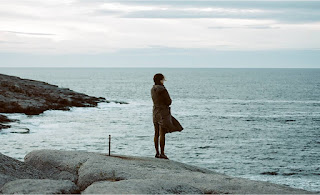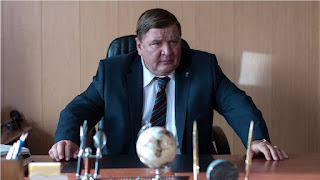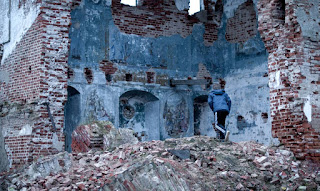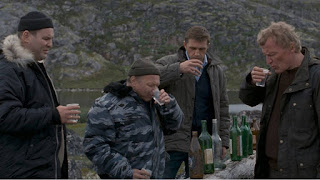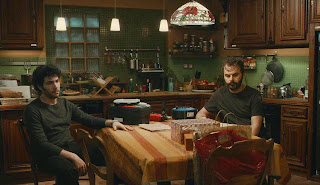Director: Jean-Pierre Dardenne, Luc Dardenne
Screenplay: Jean-Pierre Dardenne, Luc Dardenne
Starring: Marion Cotillard, Fabrizio Rongione, Catherine Salée, Christelle Cornil
Year: 2014
Language: French, Arabic
UK rental release: October 2014
IMDb
Rotten Tomatoes
This time around, we're paying a visit to the Dardenne brothers once again. For years, they've continued to deliver stunning, intimate dramas (for their beautiful pastiche of childhood rebellion, check out my review of The Kid With A Bike). Yet, with Two Days, One Night, they're taking a slightly different approach...
While resting, Sandra (Marion Cotillard, La Vie En Rose, Rust And Bone) is awoken by an alarming phone call. She finds out that her job is on the line due to a secret ballot taken up by each of her colleagues at her place of work: either they all take a bonus of €1000 with Sandra being laid off, or they choose to keep Sandra on but loose that tempting cash prize in doing so.
Sandra has been off sick for a while with depression and anxiety. Her absence has put her in the firing line and allowed the ballot to occur. Immediately, she is worried that she'll begin to suffer again as a product of this surprising election.
She tries to stay strong with help from her partner, Manu (Fabrizio Rongione, Rosetta, L'enfant), who strives to support her, reminding her that she has a right to fight for her position. She goes to see her boss, M. Dumont with one of her colleagues, Juliette (Catherine Salée, Keeper, Blue Is The Warmest Colour). As one of her only workmates who voted for her to stay, Juliette wants to do everything she can to help.
From speaking to M. Dumont, they learn that their foreman, Jean-Marc, has been leveraging the votes. Scaring staff members into electing for bonuses, he's been telling them that they could lose their job soon anyway so may as well take their bonuses. His effort makes the election sway 14 out of 16, in favour of Sandra losing her job. In light of this, and the knowledge that Sandra wasn't present at the ballot, M. Dumont agrees to a re-election.
Having only till Monday to succeed, Sandra must use her weekend to convince her work colleagues that her worth is more vital than their wallets.
Having only till Monday to succeed, Sandra must use her weekend to convince her work colleagues that her worth is more vital than their wallets.
Naturally lit through most of it, with lovely handheld lens work, Two Days, One Night is pleasant on the eye. Unusually for the Dardennes, there's very little on scenery and more focus on close-ups, making the picture feel a little claustrophobic. However, if you can see past this, appreciating the intimacy of the people as opposed to the environment that surrounds them, you'll sense how this emphasises the core plot and drive of the film.
For example, during a brief reprieve from their many visits our two leads sit in a park, enjoying an ice cream, discussing whether to continue on this saga. Hearing a bird's song, Sandra says "I wish that was me". In previous Dardenne movies, the camera would have mainly shot the bird, with Cotillard's dialogue off camera, sun shining through the tree, illuminating the leaves, illustrating an artistic eye.
Instead, the lens stays fixed on the pair, as Sandra longingly glares off camera at the easier life. Simplistic. Direct. Gently impactful. It's a template for the entire piece and the effect is gentle yet stunning.
Instead, the lens stays fixed on the pair, as Sandra longingly glares off camera at the easier life. Simplistic. Direct. Gently impactful. It's a template for the entire piece and the effect is gentle yet stunning.
Her reaction during this scene is a product of Sandra's evolution through the story so far, learning more and more each time she's faced with confronting a fellow employee, as she both strengthens and crumbles through the experience. This is beautifully encompassed by Marion Cotillard, as she proves yet again that she is one of the finest actresses of our generation (read about her stunning performance in Rust And Bone here).
Little-or-no make-up, vest tops, tied back hair - still with such a simple costume, Cotillard proves her talent by delivering a performance with colour, turmoil, panache and vibrancy. Once more, she elevates a film with her subtle and dexterous approach to a role of a troubled, interesting soul. Such a character would have been saturated with cliché by many others, heavily handled with little regard for realism, where Cotillard handles Sandra with careful finger tips from a thoughtful veranda.
Little-or-no make-up, vest tops, tied back hair - still with such a simple costume, Cotillard proves her talent by delivering a performance with colour, turmoil, panache and vibrancy. Once more, she elevates a film with her subtle and dexterous approach to a role of a troubled, interesting soul. Such a character would have been saturated with cliché by many others, heavily handled with little regard for realism, where Cotillard handles Sandra with careful finger tips from a thoughtful veranda.
And, with confident execution from the array of actors to bolster her delicate portrayal, it allows us to peer into the world that suffocates Sandra. What this piece manages brilliantly is bring new insight into how somebody under sever pressure, with familial responsibilities, has to manage the feud between their pride and their integrity.
 At first, Sandra is both loathed and embarrassed to beg a colleague for their vote. Yet, how she handles this plight, struggling through the experience, is a tenderly presented view into the emotional strengthening someone goes through while battling the remnants of mental illness. Her anxiety and depression is represented tastefully, respectfully; so pleasing considering such subject matter is generally misunderstood in most cinematic sittings.
At first, Sandra is both loathed and embarrassed to beg a colleague for their vote. Yet, how she handles this plight, struggling through the experience, is a tenderly presented view into the emotional strengthening someone goes through while battling the remnants of mental illness. Her anxiety and depression is represented tastefully, respectfully; so pleasing considering such subject matter is generally misunderstood in most cinematic sittings.
It has the desired effect, raising questions as to whether she is fit enough to return to work. It also makes you question what it is that Jean-Marc is up to. The mystery of her foreman's "treachery" (although not entirely revealed) is a nice MacGuffin, yet it's not that which drives the film...
 At first, Sandra is both loathed and embarrassed to beg a colleague for their vote. Yet, how she handles this plight, struggling through the experience, is a tenderly presented view into the emotional strengthening someone goes through while battling the remnants of mental illness. Her anxiety and depression is represented tastefully, respectfully; so pleasing considering such subject matter is generally misunderstood in most cinematic sittings.
At first, Sandra is both loathed and embarrassed to beg a colleague for their vote. Yet, how she handles this plight, struggling through the experience, is a tenderly presented view into the emotional strengthening someone goes through while battling the remnants of mental illness. Her anxiety and depression is represented tastefully, respectfully; so pleasing considering such subject matter is generally misunderstood in most cinematic sittings.It has the desired effect, raising questions as to whether she is fit enough to return to work. It also makes you question what it is that Jean-Marc is up to. The mystery of her foreman's "treachery" (although not entirely revealed) is a nice MacGuffin, yet it's not that which drives the film...
How do you ask somebody to give up their gift of €1000? It's an intriguing prospect for a movie and, as you see Sandra's journey unfold through each moment, the alternate reactions from each of her colleagues will take you in all different emotional directions.
For example, if someone desperately needs their bonus through their own despair, they're left to feel uncomfortable when learning that others are siding with Sandra. Their sympathy is empty as, if the vote goes in her favour, they lose the cash that they so rightfully need, in some cases. Out of respect they feel that they cannot show their disdain. Some even happily give the address for the next person on her list, even though this gives her the opportunity to canvass more voters.
Even if they raise the chance of swaying the votes back, how can they not help someone else who has needs like themselves. Such confliction between what's right to survive and what's humane is what illuminates the picture. Watching each meeting is so gripping, purely in the underlying complexity of the conversation. It's a fantastically simple mechanism for each actor to play with on screen.
Even if they raise the chance of swaying the votes back, how can they not help someone else who has needs like themselves. Such confliction between what's right to survive and what's humane is what illuminates the picture. Watching each meeting is so gripping, purely in the underlying complexity of the conversation. It's a fantastically simple mechanism for each actor to play with on screen.
Wondering whether she'll plant enough seeds to keep her job fuels your desire to see each outcome, enhancing the calm pace of the film to one of intrigue and allure. It proves the genius of the overall concept and of the Dardennes.
The brothers strike again!
A wonderful portrayal of family and friends clubbing together to support one of their tribe, Two Days, One Night does wonders at handling the struggle of overcoming anxiety and depression. It's such an incredibly tense and moving tale set over a relatively short period of time. Yet, it's the originality of the concept that thrives in this touching and reinforcing tale.
Don't forget to leave comments below, tweet me @filmbore or post on my Facebook page here.
Alternatively, you could contact me directly about this film or my other reviews on picks@filmbore.co.uk











